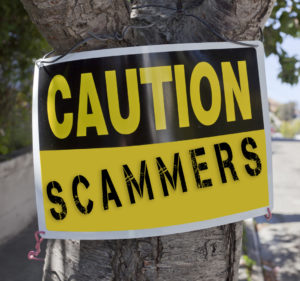Scammers Try To Steal Stimulus Checks Amid Coronavirus Confusion

Isolated yellow CAUTION SCAMMERS sign tied to tree.
As Americans endure the repercussions of the coronavirus – from the self-quarantining to the wearing of masks and gloves to the disinfecting and sanitizing of surfaces multiple times each day to the all-important and endless act of handwashing – they must endure something else just as sinister: scammers.
Scammers are out there trying to do what they do best, which is capitalizing on a crisis by taking advantage of a public that not only is distracted and scared but also starved for attention. The trifecta of emotions can cause even the most cautious of consumers to fall victim to a smooth swindle.
“While many Americans are struggling financially during the COVID-19 pandemic, a few are flourishing – including scammers,” states a Motley Fool article titled “Don’t Fall for These 7 Coronavirus Scams.” “The Federal Trade Commission (FTC) reports that Americans have lost almost $13 million in COVID-19-related scams so far. That’s probably not going to slow down until the crisis is over, so in the meantime, you need to be wise to scammers’ tricks.”
The No. 1 scam taking place right now targets the stimulus checks hitting the bank accounts and mailboxes of millions. Struggling employees are eager to receive their money, but not as eager as scammers.
“The government will be sending out stimulus checks to millions of Americans in the coming weeks, and scammers are capitalizing upon the confusion around this new process to trick people into handing over their bank account information,” according to the article. “They may call pretending to be from the government or your bank, asking you to verify your bank account for swift delivery of your check, or they might claim to have early access to the checks and offer to deposit the money into your account if you hand over your financial information.
“Don’t fall for any of it,” the article continues. “If you submitted a tax return for 2018 or 2019, there’s a good chance the government already knows where to send the money. For those it doesn’t have bank account information for, the IRS is working on a form you can use to indicate where you want the funds deposited. And if the government can’t get a bank account number for you, it will mail the check to your last known address. It will never contact you by phone, email, or mail asking you to verify your information.”
The fact is most taxpayers need not do anything to procure their checks. If, however, a return was not filed for 2018 or 2019, a form might have to be submitted. Other than that, the process is automatic.
“Do not give anyone your personal information to “sign-up” for your relief check,” states a Federal Trade Commission blog titled “Want to get your Coronavirus relief check? Scammers do too.” “There is nothing to sign up for. Anyone calling to ask for your personal information, like your Social Security number, PayPal account, or bank information is a scammer, plain and simple. Also be on the lookout for email phishing scams, where scammers pretend to be from the government and ask for your information as part of the “sign-up” process for the checks.”
The package passed by the Senate on March 25, 2020, includes payments of $1,200 to taxpayers earning $75,000 or less and $2,400 to households with incomes of $150,000 or less. It also expands unemployment by providing those who have been laid off from their jobs – a number at an historic high – their full salaries for four- months.
“With millions of people out of work and expecting to file for these benefits, hackers could have an opportunity to snare unsuspecting victims,” states a CNET article titled “FBI issues warning about COVID-19 stimulus-package scams.” “In a warning from the FBI’s Internet Crime Complaint Center, the agency explained that the US government would never send an email out asking for people’s personal information to get federal aid.”
For more information, visit www.irs.gov/coronavirus.
To file a complaint, visit www.ftc.gov/complaint.
To report a scammer, visit www.ic3.gov.
“History has shown that criminals take every opportunity to perpetrate a fraud on unsuspecting victims, especially when a group of people is vulnerable or in a state of need,” Don Fort, who heads the criminal-investigations unit at the Internal Revenue Service, told CNBC in an article titled “Scammers look to steal your stimulus check.” “While you are waiting to hear about your economic impact payment, criminals are working hard to trick you into getting their hands on it.”
Share This


